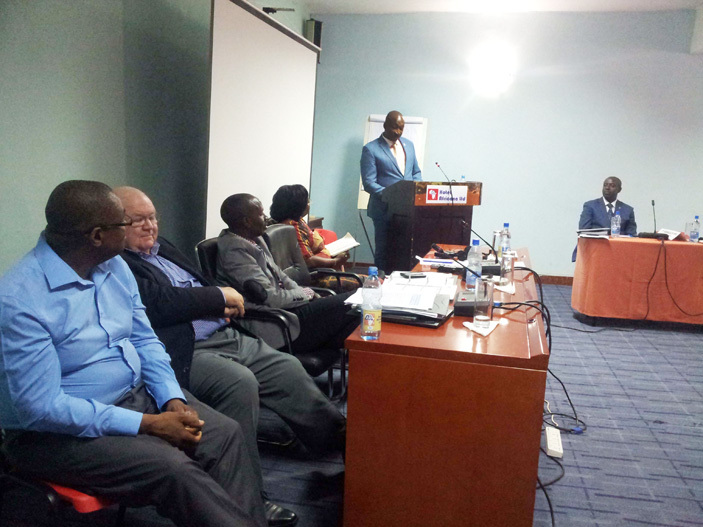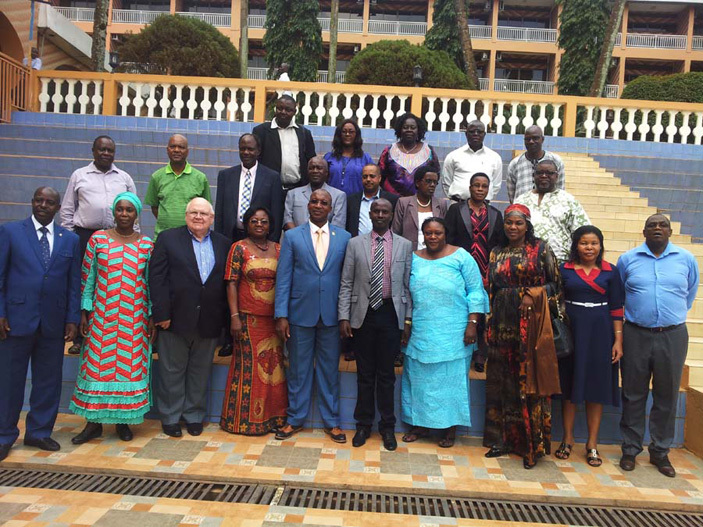Teachers advancing campaigns against Edubusiness
Sep 14, 2016
“Privatisation in education will not bring equity among children. The rich will continue getting quality education from private schools, while the poor will continue getting poor quality education from public schools..."

PIC: Wilson Sossion, the Secretary General Kenya National Union of Teachers (Knut) and also the president of EIARC (R), minister of state for labour, employment and industrial relations Herbert Kabafunzaki (2nd R),and James Tweheyo the UNATU general secretary (L) chatting during the meeting. Photos by Andrew Masinde
Teachers from African countries under their umbrella group, Education International Regional African Committee (EIRAC) are advancing their campaign against commercialising education. The teachers say education has turned into business, widening the gap between the rich and the poor further.
The teachers revealed this on Tuesday during their EIRAC meeting that is being held in Uganda for the first time at Hotel Africana, Kampala.
They noted that it may not be an exaggeration to say that commercialisation in education is creating inequalities in opportunities for education.
James Tweheyo, the UNATU general secretary, said that the problem is compounded by governments passing their responsibility to the private sector as a strategy for development, professional development and implementing national standardised testing.
 Minister of state for labour, employment and industrial relations Herbert Kabafunzaki addressing teachers
Minister of state for labour, employment and industrial relations Herbert Kabafunzaki addressing teachers
"Privatisation in education will not bring equity among children. The rich will continue getting quality education from private schools, while the poor will continue getting poor quality education from public schools. This is because education is now becoming a business not a service. That is why as teachers we won't just look on," he noted.
The teachers also pledged to improve the performance and standards of education if the budgets for education are increased, noting that African governments should commit to allocate at least 6% of the GDP and at least 20% of their national budgets to education.
Wilson Sossion, the Secretary General Kenya National Union of Teachers (KNUT), and also the president of EIARC noted that the challenge of literacy and numeracy are still a challenge in Africa because governments are not investing enough in it.
"The quality in the above can only be realised if governments invest in quality infrastructural development in schools, invest in recruiting and supporting and remunerating and capacity building of quality teachers. And all this is only possible if governments invest more finances in the education sector, then after demand for quality education from teachers," Sossion noted.
 Minister of state for labour, employment and industrial relations Herbert Kabafunzaki (centre) pose for a picture with teachers from different African countries
Minister of state for labour, employment and industrial relations Herbert Kabafunzaki (centre) pose for a picture with teachers from different African countries
According to Charlie Lennon, the deputy secretary EIRAC, development partners and rich countries must support low income countries which cannot mobilize sufficient resources locally. For that to happen, all donor countries should allocate at least 0.7% of their gross national income to Official Development Assistance (ODA) and ensure that at least 10% of that goes to education.
Significant improvement in education will ensure quality education and safe learning environments for all students and a decent working condition for teachers and entire education workforce. However the GMR report notes that aid is not distributed fairly among those nations in need.
According to the global education monitoring report (GEM), aid to education needs to increase by at least six times to fill the annual finance gap of $39 billion in order to provide 12 years of quality education for all. Yet the latest analysis shows that, rather than rising, levels of aid to the sector are 8% lower than they were in 2010. This will make education progress extremely difficult, or impossible, for many countries still reliant on financial support from donors.
Minister of state for labour, employment and Industrial relations Herbert Kabafunzaki noted that government through negotiations with UNATU has increased teachers' salaries over the last 10years by over 300% and that the government has also given about sh6billions to the UNATU saving and credit scheme all this aimed at improving the welfare of teachers.
"There is still more to do in addressing the welfare concerns of the teachers in Uganda, however, with continued political stability and steady economic progress these challenges will be addressed," the minister noted.
He added that improving the welfare of the teachers is not an end in itself but a means to improving education out comes and the capacity of leaners to acquire new skills.
"As government, we are concerned that despite prioritizing the wages of teachers amidst tight budgetary constraints, education outcomes remain far from satisfactory. All African countries still have pupils who complete primary school but still find challenges to read, write of solve simple mathematical problems efficiently," he noted.
